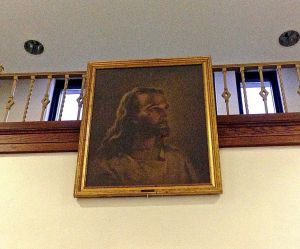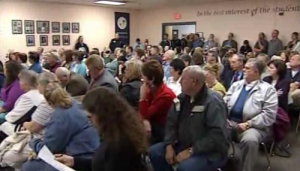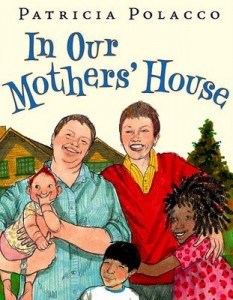Meanwhile, outside the walls of PantheaCon, I have been busy tending the Wild Hunt’s hearth fires and watching the news….
The sheer number of stories describing the intersection of faith and public education has been overwhelming in recent weeks. In fact, Americans United (AU) believes that 2013 will be a “pivotal year for church-state separation.” According to AU, the country’s increasing religious diversity and the recent failures of evangelical Christian politics are fueling the fight to force religion back into public schools.
Since January, five states already have anti-evolution bills “in play” including, Missouri, Montana, Colorado, Oklahoma and Indiana. AU writer Simon Brown remarked, “The mantra of Indiana state Sen. Dennis Kruse (R-Auburn) seems to be: ‘Darn the Constitution, full speed ahead!’”
Just last week, the ACLU of Ohio filed a lawsuit against the Jackson City School District for refusing to remove a portrait of Jesus from Jackson Middle School. The School Board’s justification for non-compliance was that the portrait was a gift. However, there’s that darn Constitution again. Now, the Jackson City School Board is being sued.

Portrait Hanging in Jackson Middle School
There are similar cases across the country. Whether it’s Creationism, school prayer, religious displays or school vouchers, the challenges continue. As such, it is very easy to get caught up in the contentious discourse surrounding these cases. From a media perspective, conflicts are considered more “ sell-able” because they stir emotions and keep us tuned-in. The positive outcomes are often quite boring.
As a result, we forget to adequately acknowledge these “happy-endings” or record the positive gains. When one battle ends, another always seems to flare up. It’s much easier to watch the new fires than see the sprouts rising through the ashes of old battles.
However, I have and will always argue that it is essential for all of us, especially those on the front lines, to purposefully acknowledge positive progress; no matter how small, how subtle or how utterly boring. Once in awhile, it’s nice to have the opportunity to do an “end-zone” victory dance and fly a flag or two. With that in mind, I’d like to update two stories that involved challenges to liberty within the public schools.
Let’s start in the South. One of last year’s top ten stories was the struggle to protect religious freedom within the Buncombe County School (BCS) system of North Carolina. This was the case that began when Ginger Strivelli, a local Pagan mother, challenged the presence of Gideon Bibles in her daughter’s school. Over multiple contentious meetings, the school board finally enacted policies that would ostensibly prevent any First Amendment violations and, in addition, would pave the way for interfaith talks.

A view of the Buncombe school board meeting.
During the early days of this case, I worked as Lady Liberty League’s Media Adviser. As such, I have written numerous case reports and articles; the last of which was just published in Circle Magazine’s latest issue (#112). That article contains the full scope of the Board’s newly enacted policy changes.
Here are some of the highlights. The Buncombe County School Board (BCS) has created a Faith-Based Advisory panel to act as consultant for all faith-based issues. Local Pagan, Byron Ballard, who has been actively involved in this case, now sits on that panel. In addition, the Board encouraged all teachers to celebrate National Religious Freedom Day on January 16th. On the first of January, the Board formally announced this intention and stated that all children will watch the newly produced BCS program called: “The 3Rs of Religion.”
Byron has confirmed that the overall progress has continued to be very positive. In fact, for the first time in a year, Byron will not be attending the Buncombe County School Board meeting. We are witnessing the evolution of a community and recognition of social change. However Byron did add:
“I’m cautiously optimistic about the relationship with the county school system, but I am aware that it will have to be monitored forever after. Vigilance, like strong fences, makes for good neighbors.”
Buncombe County’s story may not yet be fully written.
Now, let’s move over to Utah. In November, I reported on the ACLU’s lawsuit against the Davis School District in Utah. One of its schools, Windridge Elementary, had restricted access to the book In Our Mothers’ House by Patricia Polocco because of its depiction of gay marriage. The restriction was initially supported by the district and encouraged for all lower grades. In November, the advisory council stated, “Members of our Community Council feel that the book is non-offensive, but agree that it should be restricted. It can be found behind the Librarians desk.” Shortly thereafter, parent Tina Weber challenged the legality of the decision which resulted in the ACLU’s lawsuit.

On January 31, the ACLU reported that the Davis School Board has reversed that 2012 decision and put Our Mothers’ House back on all library shelves. In a letter to the Board’s legal adviser Assistant Superintendent, Pamela Park wrote, “I agree with and support the Committee’s conclusion regarding the book as follows:
- “Removing the book completely is not a good option.”
- “We all know many non-traditional families” with students attending our schools.
- “It could help those children in same-sex families see their family in a book.”
- “[T]his book teaches acceptance and tolerance.”
- “The book could help prevent bullying of kids from same-sex families.”
- “It could be used by families to discuss the issues….”
Park also confirmed that the book’s presence does not violate Utah educational policies because it’s not used as instructional material. She continues to advise that any parent who feels the book is inappropriate can contact the librarian and have the book restricted from his or her child only. You can read the letter in its entirety here.
The Utah case wasn’t necessarily a church-state issue. The school was restricting Patricia Polocco’s freedom of speech more than violating religious liberty. However, it could be argued that the case did have a religious freedom element. The Board restricted the book based on what could be considered a faith-based opinion. It’s opponents complained that In Our Mothers’ House “normalizes a lifestyle we don’t agree with.” Removing the book on such a basis promotes one faith’s value system over another. Facilitating parental choice supports the values of all people; no matter their religion or position on gay marriage.
Celebrating the work done in both Utah and North Carolina, and other similar cases, does not at all detract from the serious nature of defending First Amendment freedoms allowed by the darn Constitution. Nor does it show disrespect for those cases not yet closed. Acknowledging progress strengthens our spirit and allows us to stand again. It restores our faith in the American system. We need this time to breathe.
So, in honor of the work done by those in Buncombe County and Davis County, “Way to Go!” Take your victory lap.
The Wild Hunt is not responsible for links to external content.
To join a conversation on this post:
Visit our The Wild Hunt subreddit! Point your favorite browser to https://www.reddit.com/r/The_Wild_Hunt_News/, then click “JOIN”. Make sure to click the bell, too, to be notified of new articles posted to our subreddit.
Damn good work.
PS – Beavers make dams.
The word ‘darn’ was used in this post. (The ‘r’ and the ‘n’ together can tend to look like an ‘m’.)
You are quite right, we need to take victory laps when appropriate. A focus only on our distress leads to paranoia in groups and ulcers in individuals.
Whether the Utah case was actually church-state is a nice question. If you strip down the motives for the original ban, it was not in terms of a value that any civil society needs to remain civil, even though also endorsed by religions — like bans on theft and murder — but on socially arbitrary values elevated by some religions but rejected by others. In that circumstances it’s an arguably unconstitutional valorization of some religions over others by the state.
This is a two-edged argument. Ie, it could be used against us at some future time. I can’t instantly come up with a for-instance, but use your dark imaginations, people.
The BCS video is amazingly good. Let it be disseminated!
I do not understand all this,so what a picture of Christ,a gift.It is not like people are worshipping the pic.And as far as books?what is everyones deal,if there is a book that as a parent you dont approve of for your own beliefs then sont let your child read it.End of story case closed move on.When i attended school in New Jersey we had pledge to the flag,and then our silent prayer,and guess what we had Christians,Catholics,Jews,Muslim,and other religions and you know what none of cared we did not think twice about the muslim boy on his mat praying,or us Catholics praying,it is life,and you know what else….we learned about each others religions,and what holidays they celebrated,we had all kinds of holiday decorations in our school to honor everyone and NO ONE MINDED OR THOUGHT ANYTHING BAD!!I do not understand what is wrong with people today,accept everyone learn from each other and things would be better and so would the schools.
I believe the point of the matter is that there is an institutional bias in favour of Christianity in a country where there is at least one major law banning institutional bias towards any religion.
Not even a law. A foundational aspect of the entire country’s existence.
Still a law, isn’t it?
Shawnann, I believe you are assuming that “no one minded or thought anything bad”. It is very likely that those who did mind were not free to speak up lest they be ostracized or worse. I respect your call to individual responsibility, but we also have a responsibility to not allow school teachers to promote one faith over the other. That’s the issue.
@Shawnann Dunkin In retail, that’s generally known as passive selling. The idea is to indoctrinate a consumer prior to their purchase, to predispose them into picking out a product or service that you offer. It might not be at that moment, but the idea is that they’ll retain the information and either impulse buy the item you’re passively selling, or remember it for when they need it.
When a governmental body or organization places emphasis on one religious institution, not only is it selling it to the consumer, but it’s also selling it in a way that denotes tacit support and exclusivity, an underlying sense of a monolithic approval that puts minority groups out of sorts. In the case of public buildings and groups that receive public funding, that’s not supposed to be the case.
This is out there, but were a non-Christian to walk into a family court for a divorce proceeding, only to see busts and paintings of Christ excessively portrayed, how could they feel comfortable that they were going to be treated equally and fairly when this exclusive religion is being portrayed so prominently?
Perhaps your ambivalence is a result of the fact that you, yourself, are part of the group that is favored. As a Catholic, lapsed or not (I do not know you), you’re a member of the larger community which is endowed with this excessive privilege. At least, this is as I understand it from your post. Society effectively caters to you and you religious beliefs and, even if you’re not an active participant in it, still considers you to be “first among equals”. As you are nominally Christian, you see no issue with a picture of Christ being hanged, or, probably, the images of the Ten Commandments in front of court houses, because it’s a familiar part of your religious experience.
Know that I don’t mean this to disrespect you, or your beliefs.
Also, you went to school in the Northeast, where nominally they’re a lot more cosmopolitan. The Northeastern experience is definitely not the standard for the rest of the country.
The picture of Christ unfairly advantages the already privileged.
Different treatment of the book unfairly further marginalizes the already marginalized.
“No one minded or thought anything bad” is not true. Such practices were banned from public schools after the marginalized revolted and took school systems to court.
LOVE the BCS video. And the broad-based support that is implied by the many contributors to it. I’d say it’s a model for any school system in the country–Byron Ballard and the Faith-Based Advisory should be proud.
Thank you for the positivity. I’m sharing this over on the Pagan Causes and Charities page on Facebook. I had hoped to include positive stories of progress on that page and here one is. Thanks again for stopping along the journey to recognize the distance we have travelled instead of focusing solely on the road ahead.